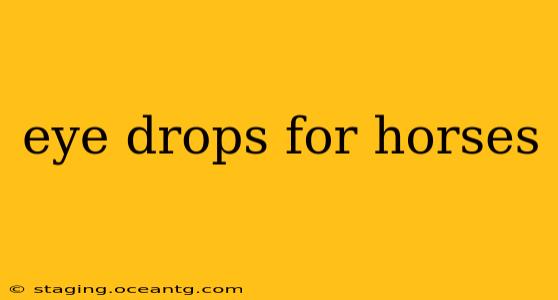Eye problems in horses can range from minor irritations to serious conditions requiring veterinary attention. Understanding the types of eye drops available and when to use them is crucial for responsible equine care. This guide provides a comprehensive overview of eye drops for horses, addressing common concerns and offering valuable insights for horse owners.
What Types of Eye Drops Are Used for Horses?
Several types of eye drops are used to treat various equine eye conditions. These include:
- Artificial Tears: These lubricate the eye and are often used for dry eye or minor irritations. They usually contain ingredients like hyaluronic acid or other moisturizing agents.
- Antibiotic Eye Drops: Prescribed by a veterinarian to treat bacterial infections. These drops contain antibiotics that target specific bacteria causing the infection. Never use human antibiotic eye drops on a horse.
- Antiviral Eye Drops: Used to combat viral infections of the eye, these are also only available via veterinary prescription.
- Anti-inflammatory Eye Drops: These reduce inflammation and swelling in the eye, often used for conditions like uveitis or corneal ulcers. Again, these require a vet's prescription.
- Steroid Eye Drops: Powerful anti-inflammatory medications used to treat severe eye inflammation; however, they must be used cautiously and under strict veterinary supervision due to potential side effects.
It's crucial to remember that you should never administer any medication to your horse without first consulting with your veterinarian. They can properly diagnose the condition and prescribe the appropriate medication and dosage. Improper treatment can worsen the problem.
How Do I Administer Eye Drops to My Horse?
Administering eye drops to a horse requires a gentle and careful approach to avoid injury to the animal and ensure proper medication application. Your veterinarian will likely demonstrate the correct technique. Generally, it involves:
- Restraining the horse safely: This might involve a halter and lead rope or assistance from another person.
- Cleaning the eye area: Gently wipe away any debris or discharge around the eye with a clean, damp cloth.
- Applying the drops: Gently pull down the lower eyelid to create a pouch. Squeeze the appropriate number of drops into the pouch.
- Massaging gently: Gently massage the eyelid to help distribute the drops evenly across the eye.
What are the Common Eye Problems in Horses Requiring Eye Drops?
Several conditions might necessitate the use of eye drops in horses. These include:
- Conjunctivitis (Pink Eye): Inflammation of the conjunctiva (the membrane lining the eyelid and covering the white part of the eye).
- Corneal Ulcers: Open sores on the cornea (the clear front part of the eye).
- Uveitis: Inflammation of the uvea (the middle layer of the eye).
- Dry Eye Syndrome: Lack of sufficient tear production, leading to discomfort and potential damage to the eye.
- Equine Recurrent Uveitis (ERU): A chronic inflammatory condition affecting the uvea.
When Should I Call My Veterinarian About My Horse's Eyes?
Any changes in your horse's eyes should be reported to your veterinarian promptly. This includes:
- Swelling: Significant swelling of the eye or eyelids.
- Discharge: Any unusual discharge, whether it is watery, cloudy, or purulent (pus-like).
- Squinting: If your horse is squinting or keeping its eye closed.
- Cloudiness: If the cornea appears cloudy or opaque.
- Redness: Excessive redness in the eye.
- Sensitivity to Light: If your horse seems sensitive to light.
Prompt veterinary attention can help prevent serious complications and preserve your horse's eyesight.
Are there any over-the-counter eye drops safe for horses?
While some artificial tear products are marketed for animals, it's crucial to consult your veterinarian before using any over-the-counter eye drops on your horse. They can advise on suitable products and ensure safe usage. Never use human eye drops on your horse. The ingredients may be harmful and ineffective.
This information is for general knowledge and does not constitute veterinary advice. Always consult your veterinarian for any concerns about your horse's health. They can diagnose the problem accurately and recommend the appropriate treatment plan. Early intervention is key to successful treatment of eye conditions in horses.
